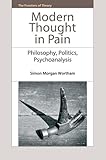Modern Thought in Pain : Philosophy, Politics, Psychoanalysis / Simon Morgan Wortham.
Material type: TextSeries: The Frontiers of Theory : FRTHPublisher: Edinburgh : Edinburgh University Press, [2022]Copyright date: ©2014Description: 1 online resource (168 p.)Content type:
TextSeries: The Frontiers of Theory : FRTHPublisher: Edinburgh : Edinburgh University Press, [2022]Copyright date: ©2014Description: 1 online resource (168 p.)Content type: - 9780748692415
- 9780748692422
- 190 23
- B804 .W66 2015
- B804 .W66 2015
- online - DeGruyter
| Item type | Current library | Call number | URL | Status | Notes | Barcode | |
|---|---|---|---|---|---|---|---|
 eBook
eBook
|
Biblioteca "Angelicum" Pont. Univ. S.Tommaso d'Aquino Nuvola online | online - DeGruyter (Browse shelf(Opens below)) | Online access | Not for loan (Accesso limitato) | Accesso per gli utenti autorizzati / Access for authorized users | (dgr)9780748692422 |
Frontmatter -- Contents -- Series Editor’s Preface -- Acknowledgements -- Introduction: Modern Thought in Pain -- Chapter 1 After Pains -- Chapter 2 Distress I -- Chapter 3 Distress II -- Chapter 4 Pain of Debt, or, What We Owe to Retroactivity -- Chapter 5 Survival of Cruelty -- Chapter 6 Grief-substitutes, or, Why Melanie Klein Is So Funny -- Index
restricted access online access with authorization star
http://purl.org/coar/access_right/c_16ec
Analyses how modern conceptions of politics, ethics, and critical thought may be re-evaluated through the question of painGBS_insertPreviewButtonPopup(['ISBN:9780748692415','ISBN:97807486924722','ISBN:9780748692439']);Through a series of rigorous encounters with key critical figures, this monograph argues that modern thought is, in a double sense, the thought of pain. This book investigates the idea that modern European philosophy after Kant offers less the conceptual equipment to tackle pain in explanatory terms, than an experience of thought that participates in the forms of pain and suffering about which it speaks. Perhaps surprisingly, the question of pain establishes a ground from which to examine key debates in twentieth-century European philosophy, most recently between forms of post-structuralist and ethical thinking imagined to be in crisis and the resurgence of discourses of political emancipation arising from traditions of thought associated with Marxism. Key features:Offers a systematic account of the modern European tradition’s relationship to the question of pain and sufferingSuggests new readings of ‘ethics’ and ‘evil’Evaluates the politics of contemporary critical theorySets new agendas for reading post-Kantian philosophy"
Mode of access: Internet via World Wide Web.
In English.
Description based on online resource; title from PDF title page (publisher's Web site, viewed 29. Jun 2022)


